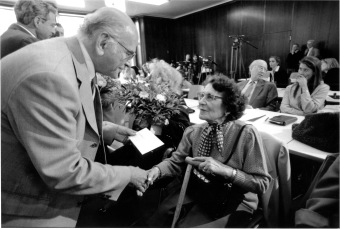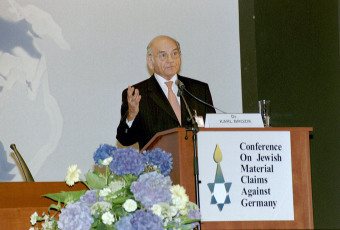Karl Brozik (1926–2004)

Foto: Claims Conference, Frankfurt

Claims Conference, Frankfurt
“Norbert Wollheim, may he rest in peace, is a model in his commitment to humanity and justice, his death […] a loss for us all.”[1]
Karl Brozik (formerly Abeles), born in Teplice, Czechoslovakia, on February 4, 1926, was the youngest of the three sons of Czech-German Jewish parents. After the onset of the German occupation, the family had to leave their home and move to Prague. On October 22, 1941, while they continued to wait for an American visa, they all were transported to the Łódź ghetto in Poland, where Karl Brozik’s father, mother, and brother Hans Abeles died of exhaustion and hunger.
In the summer of 1944, Karl Brozik was deported to the Auschwitz-Birkenau concentration camp. He escaped being gassed only by being assigned to forced labor of the harshest kind. He experienced yet another form of intense horror in January 1945, when SS forced the Auschwitz prisoners to set out on the death march to the Mauthausen concentration camp. At Gusen, a Mauthausen subcamp, Karl Brozik was subjected to forced labor in underground bunkers, helping to build aircraft. On May 5, 1945, ill and weighing only 42 kilograms (92 pounds), he was liberated by the U.S. Army.
Upon returning to Prague, Karl Brozik learned that all 26 members of his family had been murdered by the Nazis. He was faced with ruin and had to start building a life all over again. He went back and finished high school as a working student, studied law, and received a doctoral degree. In 1949, he married Hilda Katz, also an Auschwitz survivor, fathered two sons, and began carving out a career in the Czechoslovak Foreign Trade Ministry.
The promising new start to his career was abruptly interrupted, however, when the Prague government gave orders for Jews to be removed from the civil service: Karl Brozik was forced to leave public service, and he took over the management of an arts and crafts collective. As a supporter of the Prague Spring reforms in 1968, once the Warsaw Pact troops invaded he saw no alternative but to flee from his homeland. That same year, via Hungary, he and his family emigrated to Frankfurt am Main, where he soon was working for the United Restitution Organization. In 1987, he became the representative of the Conference on Jewish Material Claims Against Germany (Claims Conference) in Germany.
As head of Compensation Treuhand GmbH, Karl Brozik brought about the payment of compensation to former slave laborers by Dynamit Nobel, on the basis of the agreement reached in 1986 between the Claims Conference and Dynamit Nobel, which formerly was a part of the Flick concern and at that time was owned by Deutsche Bank.
In addition, he was the principal negotiator with the Federal Ministry of Finance with regard to compensation issues. After the expiration of the application deadlines under the Federal Compensation Laws (BEG, Bundesentschädigungsgesetz) in 1969, the focus was on efforts to extend West Germany’s compensation for the Nazis’ wrongs to include those persecutees who had been denied the BEG’s benefits because they were residents of Central and Eastern Europe. With the increasing permeability of the Iron Curtain, that became a pressing concern of the Claims Conference in the 1980s and 1990s. Karl Brozik played a direct and responsible part in the setting up of the Hardship Fund and in the institution of the Article 2 Fund.
His initiative and participation were instrumental in the establishment of the Central and Eastern European Fund (CEEF), which for the first time made assistance possible for Jewish victims of persecution who lived in Central and Eastern Europe. Owing in large measure to his dedication, the initial plan to have different bases of assessment for Western countries and for Eastern Europe was scrapped when the Federal Foundation for Compensation of Former Slave and Forced Laborers was set up in 2000.
Karl Brozik died on August 18, 2004, at the age of 78, during a short visit to his native Czech Republic, only a few weeks after the release of the second installment of funds for compensation payments to forced laborers by the “Remembrance, Responsibility, and Future” Foundation. Dr. Karl Brozik was the spokesman of the Survivors’ Council of the Fritz Bauer Institute, a member of the advisory panel of the Hessian Hardship Fund for Victims of National Socialist Injustice, a member of the executive board of the Theresienstadt (Terezin) Initiative, and a holder of the Wilhelm Leuschner Medal (Wiesbaden, 1997), the Medal of Resistance against Fascism (Prague, 1999), the Badge of Honor of the City of Frankfurt am Main (Frankfurt, 2002), and the Order of Merit of the Czech Republic (Berlin, 2003).
With great forcefulness, Karl Brozik engaged in conversations with school students, serving as a contemporary witness to the horrors of the Holocaust.
(EA; transl. KL)
















